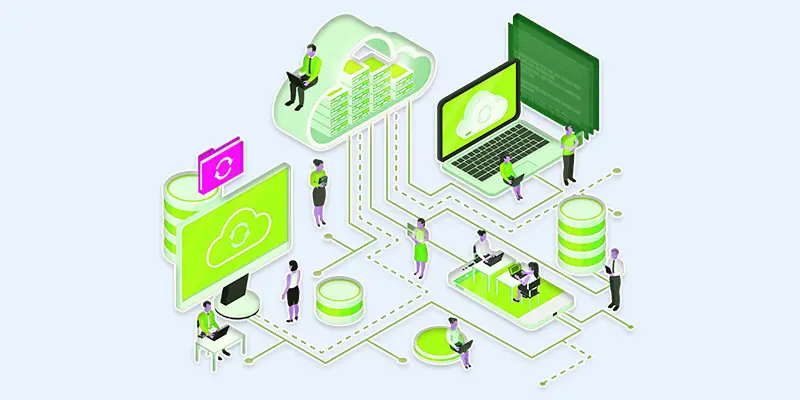Key Features of Cloud Computing to Drive Business Growth
Published: 18 May 2025
Characteristics of Cloud Computing
Cloud computing has changed how we store, share, and use data offering speed, flexibility, and lower costs. But what exactly makes it so powerful? Many people struggle to understand the key features, especially when dealing with limited storage or expensive software. Let’s simplify the features of cloud computing, which are already present in your everyday life, whether you’re sending emails or streaming videos.
Features of Cloud Computing
The characteristics of cloud computing show how it works and why it’s useful for storing, sharing, and using data online.

- On-Demand Self-Service
- Broad Network Access
- Resource Pooling
- Rapid Elasticity
- Measured Service
- Scalability
- Reliability
- Security
- Automation
- Multi-Tenancy
On-Demand Self-Service
You can access cloud services whenever you want without asking anyone thanks to on-demand self-service. Just like streaming a movie online, you click and it works right away. It’s fast and easy to use.
Broad Network Access
If you have internet connectivity, you can use any device to access cloud services from any location. Whether it’s your phone, tablet, or laptop, you can use it easily on the go.
Resource Pooling
Resource Pooling means the cloud shares its resources, like storage and computing power, with many users. It’s like a public library where everyone can borrow books without using up the entire collection. This makes it cheaper and more efficient for everyone.
Rapid Elasticity
Rapid Elasticity means the cloud can quickly adjust to your needs. If you need more space or power, it can expand right away. When you need less, it shrinks back, saving you money and resources.
Measured Service
Measured Service means you only pay for what you use in the cloud. It’s like paying for electricity—you’re charged based on how much you consume, not a flat rate. This helps save money and makes it easy to manage costs.
Scalability
Scalability means the cloud can grow or shrink based on your needs. If your business gets bigger or you need more storage, the cloud can expand quickly. When things slow down, it can reduce resources to save money.
Reliability
Reliability means the cloud is trustworthy and always available when you need it. It ensures your data and services are up and running most of the time, with minimal downtime or interruptions.
Security
Security means the cloud keeps your data safe from unauthorized access. It uses tools like encryption and strong passwords to protect your information, just like locking your files in a secure vault.
Automation
Automation means the cloud can perform tasks on its own without needing you to do everything manually. For example, it can automatically back up your files or update software, saving you time and effort.
Multi-Tenancy
Multiple users can share the same cloud resources thanks to multi-tenancy, yet their data remains secure and isolated. It’s like living in an apartment building where everyone has their own space, but you all share the same building.

Conclusion About Cloud Computing Features
The properties of cloud computing are redefining the way organisations and individuals view technology. After exploring its scalability, flexibility, and cost-efficiency, it’s clear that cloud computing offers immense benefits. I recommend embracing cloud solutions to streamline operations and enhance productivity. Ready to experience the advantages for yourself? Take the next step and explore cloud computing solutions today.
FAQS
Cloud computing was developed by many companies, but major contributions came from companies like Amazon, Google, and Microsoft. They helped make cloud technology widely available to the public.
Cloud computing helps businesses save money by reducing the need for expensive hardware and allows easy access to data and applications from anywhere. It also improves collaboration and flexibility.
Cloud computing is the future because it offers scalable, flexible, and cost-effective solutions that help businesses grow quickly and efficiently without heavy investments in physical infrastructure.
Key features of cloud computing include scalability, flexibility, on-demand service, remote access, and cost efficiency.
Without requiring powerful local hardware, cloud computing enables users to access their information at any time and from any location by storing data, managing resources, and running programs over the internet.

- Be Respectful
- Stay Relevant
- Stay Positive
- True Feedback
- Encourage Discussion
- Avoid Spamming
- No Fake News
- Don't Copy-Paste
- No Personal Attacks

- Be Respectful
- Stay Relevant
- Stay Positive
- True Feedback
- Encourage Discussion
- Avoid Spamming
- No Fake News
- Don't Copy-Paste
- No Personal Attacks





